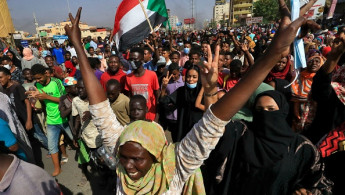Sudanese protesters take to the streets demanding civilian rule
Protests took place in Sudan's capital city on Monday evening as demands for civilian rule increase following last month's military coup.
Protesters took to Khartoum in rejection of the political agreement signed by Prime Minister Abdullah Hamdok and the commander of the Sudanese army, Abdel Fattah Al-Burhan to progress the country toward civilian rule, but protesters do not trust this pledge following the military takeover.
"Abandonment is impossible," they chanted, according to The New Arab's Arabic-language service Al-Araby Al-Jadeed.
"The revolution is the people's revolution... authority is for the people and the military is for the barracks."
More protests took place on Tuesday, following calls on Monday by activists for mass action.
Sudan's powerful Resistance Committees, along with the Sudanese Professionals Association and the Communist Party called for the demonstrations, rejecting the government's political agreement and demanding full civilian rule.
The Resistance Committees said in a statement: "Our position on the coup was and still is clear, and we do not differentiate between Prime Minister Abdullah Hamdok, Chairman of the Sovereign Council Abdel Fattah al-Burhan and his deputy, Muhammad Hamdan Dagalo, and the rest of the generals. They are all grafters for power."
The Forces of Freedom and Change, an umbrella of pro-revolution groups that signed an agreement with the former transitional council, on Tuesday morning warned against attacking protesters.
"We support and support the demands of our people and we will be at the forefront of the marches on Tuesday," they said in a statement.
"We warn the coup authorities against attacking the peaceful and free revolutionaries, as freedom of demonstration and expression is a right guaranteed by law."
Sudan, with a long history of military coups, has undergone a fragile journey toward civilian rule since the 2019 ouster of veteran autocrat Omar Al-Bashir following mass popular protests.
A joint military-civilian transition government ruled since then, but the long-troubled alliance was shattered on 25 October when General Burhan launched a putsch.
Burhan sparked international condemnation and a wave of mass protests marred by deadly crackdowns when he detained the civilian leaders and placed Hamdok under house arrest.
On Sunday, he formally reversed the power grab, standing beside a haggard-looking Hamdok at the presidential palace in Khartoum.
Together they inked a 14-point deal that officially restores the transition to civilian rule, with a pledge of holding elections in 2023.





 Follow the Middle East's top stories in English at The New Arab on Google News
Follow the Middle East's top stories in English at The New Arab on Google News
![The UAE is widely suspected of arming the RSF militia [Getty]](/sites/default/files/styles/image_330x185/public/2024-11/GettyImages-472529908.jpg?h=69f2b9d0&itok=Yauw3YTG)
![Netanyahu furiously denounced the ICC [Getty]](/sites/default/files/styles/image_330x185/public/2024-11/GettyImages-2169352575.jpg?h=199d8c1f&itok=-vRiruf5)
![Both Hamas and the Palestinian Authority welcomed the ICC arrest warrants [Getty]](/sites/default/files/styles/image_330x185/public/2024-11/GettyImages-2178351173.jpg?h=199d8c1f&itok=TV858iVg)